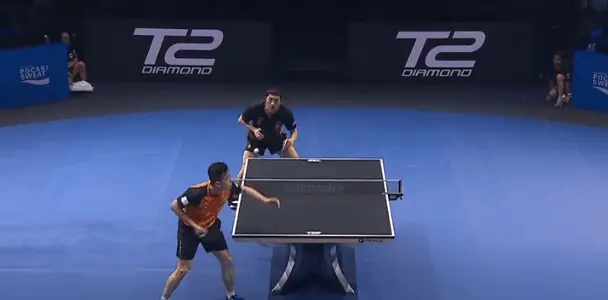Table tennis has more recently shown signs of wanting to evolve out of its traditional mold and one of the latest innovations associated with it is the T2 Diamond Table Tennis competition. Below we have all the information about what is T2 Diamond Table Tennis, why was it started, the people involved and how is it different from a typical table tennis tournament.
Table of Content
Who Formed the T2 Diamond Table Tennis?
Frank Ji is a table tennis fan but no ordinary one. The Shanghai-based businessman spent a lot of time watching many table tennis tournaments from the arena and garnered enough knowledge to make a chunky investment into the sport.
Interestingly, Frank Ji has also joined hands with the ITTF in bringing the cooler, funkier version of table tennis, called the Table Tennis X, to life. There are multiple elements which the T2 Diamond competition borrows from the TTX, including the time clock.
Interestingly, around the same time, another table tennis league, the Ultimate Table Tennis League was kick-started by organizers in India with a slightly tweaked purpose of wanting to spread the game in the country.
Why Invest in T2 Diamond Table Tennis?
Frank Ji’s rationale behind making that kind of investment is very simply the belief table tennis hasn’t evolved as much as the world around and despite being a sport which has seen participation from around 300 million people around the world, it hasn’t translated into enough cash to make it a viable career option like some of the other sports.
Speaking in an interview with StraitsTimes.com, Ji explained his decision like this:
“It was as if the table tennis I knew from when I was a child had not changed one bit, while the world around it had already transformed so much.”
“I saw that the commercial value of this sport is not being realised, despite the fact that it’s played by so many people.”
Calling table tennis a big diamond which needs to be reached out to, Ji has taken the route of a multi-pronged approach to help facilitate the monetary growth of the sport. The purpose of this is to turn table tennis into a funkier, more fashionable sport which is more appealing to both, the fans and sponsors alike.
Which brings us to the next, and very important question.
Also Read:
What is T2 Diamond Table Tennis?
T2 Diamond is a table tennis league which was initiated by Frank Ji in conjunction with the ITTF in 2016. It sees the world’s top 16 men and women table tennis players feature in a knock-out competition with a match for the bronze medal in place as well – making it 16 matches in each of the two draws.
In other words it’s on the lines of the Champions League for table tennis.
Held multiple times in a year in different cities, the T2 Diamond Table Tennis tournament sees the top 16-ranked men and women’s player qualify for the competition, and is played on a single-elimination method.
The matches are expected to be completed faster. So while they are still played on a best-of-seven games basis, the time-limit for these matches is 24 minutes; which means once a match reaches its 24th minute, the rest of the games in the match will be played over best-of-five points.
T2 Diamond Rules in Brief
- 16 men & 16 women players feature in a singles competition
- ITTF Rankings used to determine these 32 players
- One wild-card awarded to the hosting city
- Single-Elimination draw
- 16 matches in each draw including bronze-medal match
- Each match is best-of-seven games
- Each game played to 11 points (no deuce)
- Match to become a Fast5 format after the 24th minute
- Fast5 games played to five points
Previous Editions of T2 Diamond Table Tennis
2017 Johor Bahru, Malaysia
The first edition of this competition was played in its early avatar, which was then called the T2 Asia Pacific League (T2APAC). It saw a team event and singles competition as well.
Timo Boll, Alexander Shibaev and Chen Chien-An combined with Hina Hayata, Feng Tianwei and Yang Haeun to lift the team competition gold for Team Maze. They defeated Team Persson in the Grand Final, a team consisting of Jun Mizutani, Joo Saehyuk, Mattias Karsson, Bernadette Szocs, Suthasini Sawettabut and Ding Ning.
Germany’s Timo Boll won the singles gold in the men’s competition while Romania’s Bernadette Szocs lifted the women’s singles title, cruising past Feng Tianwei in the title-decider.
It was at the end of this competition that ITTF and T2 signed a collaborative deal.
2019 Johor Bahru, Malaysia
This was the second edition of the T2 Diamond Table Tennis tournament and was hosted in Johor Bahru in Malaysia with a changed format and redesigned competition. China’s Zhu Yuling won the women’s singles title while the men’s crown was won by Chinese Taipei’s Lin Yun-Ju.
Zhu defeated fellow Chinese player Wang Manyu in the women’s final, winning 9-11, 6-11, 11-7, 7-11, 2-5* while Lin was a 11-7, 11-4, 8-11, 11-5, 5-0* winner over Fan Zhendong of China in the men’s final.
The bronze medal in the women’s category was won by Ding Ning of China who beat Japanese Miyu Kato 4-0, while Xu Xin clinched the third place when he defeated Wong Chun Ting in a tough battle.
Also Read:
2019 Haikou, China
This was expected to the second T2 event to be played in 2019, but it was postponed because of the lack of requisite permits needed to host an event in China. According to Mr. Jeff Chue, the CEO and Commissioner:
“…holding an event in China requires numerous permits from various authorities, and we have sadly not been able to reach the final agreement on the terms and conditions of hosting the event.”
2019, Singapore
This third edition of the tournament was hosted by Team Sports Hall, L2 at Our Tampines Hub in Singapore.
China’s Sun Yingsha won the women’s singles title by beating Ito Mima of Japan in the final, edging her out 4-3, winning the final game 5-4 using the Fast5 format. The men’s singles draw saw China’s Xu Xin trounce Chinese Taipei’s Lin Yun-Ju 4-0 in the title-decider to win the gold medal.
Harimoto Tomokazu of Japan won the men’s singles bronze, while Wang Manyu was a 4-1 winner over South Korea’s Jeon Jihee to clinch the third place.


